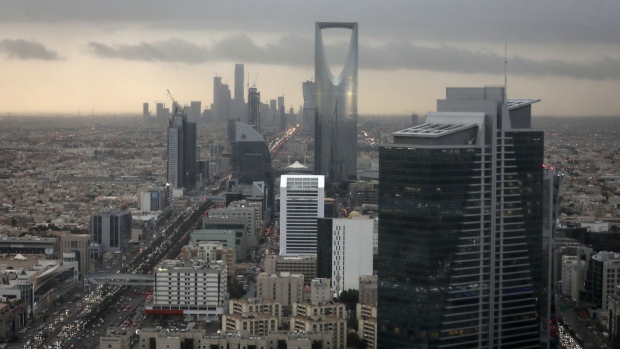Jun 26, 2019
Saudi Regulator Scraps Ownership Limit for Strategic Investors
, Bloomberg News

(Bloomberg) -- Saudi Arabia removed a cap on ownership of publicly traded companies for foreign strategic investors as the kingdom seeks to boost inflows into its stock market.
The Riyadh-based Capital Market Authority said there are no maximum or minimum limits on the ownership of listed companies for foreign strategic investors, according to a statement on Wednesday after trading hours. The limit was previously 49%. The instructions don’t apply to qualified foreign investors, according to another document on the CMA website.
The decision is a milestone for the kingdom, which started opening its market about four years ago when it first allowed foreigners to trade stocks directly. The nation has been pursing plans to diversify its oil-dependent economy since energy prices plummeted, and has identified its equity market as a means to attract foreign cash. MSCI Inc. last month started to include the kingdom’s stocks in its emerging-market index.
While the market watchdog has removed the cap, limits by other regulators or a company’s own rules still apply. One example is Jabal Omar Development Co., a real-estate developer that doesn’t allow any participation from traders abroad. Its flagship project is located within walking distance from the Grand Mosque in the holy city of Mecca, an area restricted only to Muslims.
A strategic investor buying a stake in a listed company will need to maintain the holding for at least two years, according to the CMA.
Removing limitations on strategic foreign ownership could allow international banks to take majority stakes in commercial lenders for the first time since the 1970s, when the government forced foreign lenders to sell majority stakes in their local operations to Saudi nationals. International banks including HSBC Holdings Plc, Royal Bank of Scotland Group Plc, and Credit Agricole SA are still some of the largest foreign strategic investors in listed companies in the country.
Saudi Arabia’s stock market is the largest in the Middle East and Africa, with a capitalization of $540 billion, according to data compiled by Bloomberg. The main Tadawul All Share Index has risen 11% this year, beating the advance in emerging market equities by about three percentage points.
To contact the reporters on this story: Filipe Pacheco in Dubai at fpacheco4@bloomberg.net;Matthew Martin in Dubai at mmartin128@bloomberg.net;Sarah Algethami in Riyadh at salgethami@bloomberg.net
To contact the editors responsible for this story: Celeste Perri at cperri@bloomberg.net, Dana El Baltaji, Claudia Maedler
©2019 Bloomberg L.P.


